 |
Narcissus and Goldmund
by Hermann Hesse
- Paperback: 315 pages
- Publisher: Farrar Straus Giroux; Reissue edition
(September 1988)
- Language: English
- ISBN-10: 0374506841
- ISBN-13: 978-0374506841
One of the most beautiful books I've read. The QUEST of Life.
Rating ***** 5 stars out of 5.
 Absorbing, exciting, touching, meaningful; Hesse's greatest work.
Absorbing, exciting, touching, meaningful; Hesse's greatest work.
|
"My favorite of Hesse's novels, a wonderful read.
In my college years, Hermann Hesse was one author considered required
reading by my peers. I read and reread all of his better known novels
and found them all worthwhile. But of all of Hesse's work, it is
Narcissus and Goldmund that moved me most deeply and it is the novel (of
Hesse's) to which I have returned to most often.
Like all of
Hesse's novels, it is about the the pursuit of the meaning of life, but
here the writing is less self-conscious, simpler in some ways, but
deeper in the exploring the range of human experience. It has drama,
insight, poetic vision and covers a wide range of experiences. It is
very Existential in some ways, but touches on the mystical in the arts
with a more profound effect than the more "metaphysical" manner of the
earlier novels.
This novel is about two medieval men with a very
deep friendship but with very different temperaments. The meet in a
monastery (after the death of Goldmund's mother). They appear to be
complete opposites each seeks to bring meaning to their existence;
Narcissus seeks peace and salvation (purity of mind) within a religious
life in a monastery, while Goldmund is burning with the desire to
experience life and throw himself into the world.
The story is
about finding one's way and being true to one's inner nature. Narcissus
lives a life of constraint but one that has purpose for him. Goldmund is
unhappy in the monastery, and Narcissus tells him "be yourself, try to
realize yourself" and encourages him to find his own way. The men
separate to following their own paths. We follow the lives of both of
these men, and in their contrasting experiences.
Goldmund then
wanders the world in search of adventure, love and self-discovery . He
has fantastic adventures, experiences the best and worst of humanity
surrounded by the Black Plague; and in the mist of all these hardships,
he finds meaning and beauty. After being profoundly touched by the
beauty of wooden statue of the Madonna, the artist within himself
awakens giving a new purpose and direction for his life. He seeks out
the artist and becomes his apprentice. He develops his own skills,
sacrificing the wild experiences and settling down to work (at least for
the duration of the work) and he creates a sculpture of great merit.
Hesse writes powerfully and beautifully on the conflict between the
Apollonian (understanding; form, order, restraint, conforming, the world
of the intellect/mind) and the Dionysian (experience; passion,
frivolity, lust, expression, the world of images/symbol/beauty). Hesse
is able to bring out the conflict between flesh and spirit, emotion and
control, ambition and modesty. This is a novel about the dilemma of
life, and two possible paths that of spiritual pilgrims and that of
artistic souls on the road of life. This was perfectly timed for me, in
my early twenties, this book seems to express artistically and
poignantly the central conflict of my life.
Augustine said" Only the passionate heart is pure" and
"Revelation is not revelation unless it reveals a man to himself."
When I was younger (and idealistically "spiritual"), I definitely believed in
Goldmund's view that beauty and life itself are ultimately transitory (I am
Buddhist). However, I burned with passion and was totally absorbed in the joy
and adoration for the beauty and meaning of music; Then, as I grew wiser
(certainly open to debate) I came to realize that the transitory nature of life
itself is one of the reasons that it is so precious, and so important to live
every moment, and that a great creation of art (music, literature) lives
forever, for all eternity the symphonies of Mozart will resound though the
Eternal Being that is eternally singing them. (I find it unbelievable that this
novel has not been made into a movie)
ALSO SEE THE NEXT REVIEWS an audiobook version, and an alternative transation by Dunlop
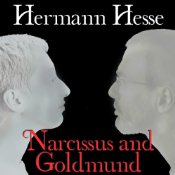 |
Narcissus and Goldmund : Audiobook
Simon Vance,
narrator
Duration: 10 hours 41 minutes
Publisher: AudioGO (2009)
Language: English
Rating ***** 5 stars out of 5.
 a wonderful narration of my favorite Hesse novel
a wonderful narration of my favorite Hesse novel
I own dozens of
audiobooks, and none are better performed than this one. The narrator,
Simon Vance, has the perfect voice, expression and pacing for such a
meaningfull story. He varies the pitch and style of his speech to
clearly portray each of the characters and expresses the difference
between the thoughts and the words of the characters. He never over-acts
nor does he ever rush the delivery. I've read the book several times,
but in my listening to the audiobook I heard details that I'd never
noticed before. As a result of the enjoyment of this performance, I've
now purchased many other audiobooks narrated by Simon Vance, they are
all well-read. Most highly recommended
|
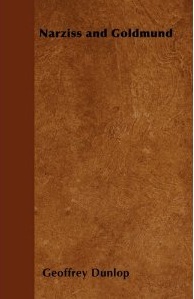 |
Narziss
and Goldumund
Hermann Hesse, Dunlop translation
Paperback: 284 pages
Publisher: Fitts Press (January 10, 2011)
Language: English
ISBN-10: 1446528227
ISBN-13: 978-1446528228
Product Dimensions: 8.3 x 5.5 x 0.9 inches
Rating ***** 4.0 stars out of 5.
 an intense, deeply moving human drama; unquestionably a masterpiece
an intense, deeply moving human drama; unquestionably a masterpiece
Rating ****
Very enjoyable
alternative translation of my favorite Hesse book, August
3, 2011
|
 |
Narziss
and Goldumund
Hermann Hesse,
Leila Vennewitz translation
Paperback: 253 pages
Publisher: Peter Owen Publishers
Language: English
ISBN-13: 978-0720611021
Product Dimensions: 7.2x 4.8 x 0.9 inches
Rating ***** 5.5 stars out of 5.
 an intense, deeply moving human drama; unquestionably a masterpiece
an intense, deeply moving human drama; unquestionably a masterpiece
Rating *****
Very enjoyable
alternative translation of my favorite Hesse book, August
3, 2011
|
Enlightening translation.
I have read most of the novels of Hesse, and Narcissis and Goldmund is my
favorite, I had read the Molinaro translation 5-6 times and assumed it was
unquestionably the best translation (and it is great) because of it's wide distribution and
predominance in the English version. I have loved Narcissis and Goldmund, but
have always noticed a certain tone in the dialogues that I considered somewhat
self-conscious or .
In college I acquired a moderate reading ability
in
German, and recently began reading it in the native language (slowly, been a
while since I used German) and found the tone of the writing was quite different
than I experienced in the English reading.
Years ago, I had found the translation
by Geoffrey Dunlop.
Recently I discovered (on one of my bookshelves) the translation by Leila
Vennewitz and it became my favorite edition. I found the reading
a total joy, almost like reading it for the first time, and this translation has a
different tone. Curious, I went back and began a
word-for-work comparison of the translations, and I find they are not even close
enough to compare. The Molinaro actually follows the German text much more
closely, Dunlop's approach is a totally free translation, it seems that he read the passages
in paragraphs and then wrote the equivalent in English translation. It is much freer, he
is not so constrained to have a sentences match sentence per sentence, he even
moves parts of a sentence to the next paragraph, but he organized the
thought/descriptions in a convincing way.
However the Vennewitz translation (a Peter Owen Modern Classic) was a joyous
discovery. It has been like
hearing a famous symphony performed at a new tempo, or seeing art that has been
restored.... I find it a really excellent work when compared to the other
translations... when it come to the impact and the self-consciousness of the
writing style. I may read Molinaro's translation again, but this will be my
favorite, and has deepened my love for this great masterpiece.
Why it
has been so overlooked is a puzzlement to me. It at least equals Molinaro's and
at least should be read as a complement.
This translation is worth searching for, if you've not found the magic of
Narcissis and Goldmund, or wish to experience it from a different view, read the
Vennewitz translation.
d
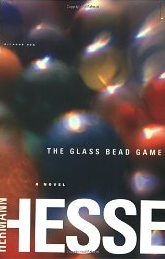 |
The Glass Bead Game: (Magister Ludi)
by Hermann Hesse
- Paperback: 576 pages
- Publisher: Picador
- Language: English
- ISBN-10: 0312278497
- ISBN-13: 978-0312278496
The Game of Life.
Rating ***** 4.5 stars out of 5.
 Hesse's second greatest work.
Hesse's second greatest work.
|
In my college years, Hermann Hesse was one author that was considered
required reading by my peers. I read and reread all of his better known novels
including Demian, Steppenwolf, Siddhartha,
Journey to the East, The Glass Bead Game: (Magister Ludi) and my favorite
Narcissus
and Goldmund.
I found the first 50 pages rather difficult reading and I put it down
several times before completing it. I was unprepared for the slow pacing,
indirection and the humor (I wasn't sure if it was intended as a satire since my expectations where set by Hesse's earler novels).
I loved
the setting and the concept of the game, but found the plot going off into a
direction other than I had expected.
Recently I reread and
thoroughly enjoyed the book and now see it as one of his better works .
Written late in Hesse's life, this book is intended for a more mature
audience, is filled with ironies and a playfulness or humor about life's
ambiguities.
The Glass Bead Game concludes with three short stories (other lifetimes
of the protagonist): The Rainmaker, The Father Confessor, and The Indian
Life. The underlying theme of the stories is that the forfeiture of self, or
self-interest, leads to redemption or an awakening. I would have found the
book easier reading, if they were presented at the beginning of the novel
rather than at the end. I think it would have set my expectations on course
with the actual novel's unfolding.
The novel is set in the future in Castalia, an academy of theoretical
research and analysis and higher persuits. However it is missing the daring
and verve of life and avoids the innovative/experiemental impulses of
true creativity.
The protaganist, Joesph Knecht is raised in this culture. He also lived
at a couple of subcultures outside Castalia. At Bamboo Grove, under Elder
Brother's tutelage he learned to meditate, play I-Ching, read Chuang Tzu,
and learn Chinese studies.
Later at a Benedictine monastery he was the guest of Father Jacobus, with
whom he discussed politics, religion, philosophy, music, and history. Knecht
learned everything to play "the game" and was elevated to the role of
Magister Ludi. But his knowledge went unapplied beyond Castalia.
"Serenely let us move to distant places
And let no sentiments of home
detain us.
The Cosmic Spirit seeks not to restrain us
But lifts us
stage by stage to wider spaces."
Patience is required to enjoy The Glass Bead Game. The story is about the
coming of age of a sensitive person who is looking for answers and
experience resulting in maturity and finding a fit in the world.
Rather, one of the aspects of the book that I found particularly
compelling is the Game itself and the ideas behind it.
The Glass Bead Game is a meditation/contemplation collaborative yet
competitive game through which the 2 players create a matrix of symbols like
creating a puzzle/chess game out of beads representing things from the
entire field of humna knowledge and experience and then adding threads of
meaning, commentaries and allusion between the beads representing links and
insights that tie them together. Each bead can represent almost anything
from all the fields of knowledge, where the point is to take concepts from
otherwise disparate disciplines and associate them in creative, profound
ways -- finding a pattern shared rhythmically by a piece of Baroque music
and spatially by ancient Chinese architecture, for example.
The intuitive processing of gaining insight and of finding and notating
these new, previously unseen associations between things is a quality of a
great mind, and the best games would be like performances that produce a new
work of art full of insight, beauty and joy.
Insight and allusion is elevated to an artform which is a commentary on
artforms.
The fascination of *Glass Bead Game* was that, for me, it began to
formalize the idea of meta-knowledge -- that is, how we think about what we
know. There's probably tons of psychology literature about this phenomenon,
learning theory, or whatnot, but Hesse manages to incorporate it not into a
dissertation on the Game, but on a decidedly artistic book that revolves
around the Game. What talent, to so eloquently present such a profound idea
as merely one aspect of a larger work of art!
Rarely have I found a concept so new and so compelling! But this is also
why I was disappointed that Hesse didn't explore and describe for the reader
the details of one of the games.
But I guess that the novel is Hesse's glass bead game performance, in the
novel he's saying everything that he wants to convey in this book which is
comprised of a novel, 13 poems, and 3 short stories.
It would be easy to find this book disjointed and tedious at times. This
book has the same esoteric spiritual search as Hesse's other books, but its
main character pursues the not out of some desperate need, seeking release
from some tragic flaw, but see the search as a inevitable process that
develops of out the life experience. So Knecht is not the character
representing the teen/angst/stranger/Steppenwolf figure, but rather a less
conflicted soul (like a person of more mature age) and therefore much less
desperate and intense for the reader.
The book has as much to say about the political / social aspects of life
as about the spiritual. The message is a very different world view than ,
say, Atlas Shrugged. The expectations of the world/life experience are
radically different. Magister Ludi is about balance of every aspect of the
human character, and the novel proceeds from diversity to unity by it's
conclusion. A fitting conclusion to the work of one the greatest writers of
all time.
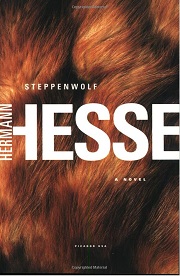 |
Steppenwolf
Hesse
Paperback: 824 pages
Publisher: Farrar, Straus and Giroux (June 14, 2002)
Language: English
ISBN-10: 0374528373
ISBN-13: 978-0374528379
Rating ***** 4.5 stars out of 5.
 an intense, deeply moving human drama; unquestionably a masterpiece
an intense, deeply moving human drama; unquestionably a masterpiece |
I can use many of the same word that I used to describe
Dostoevksy: intense, penetrating, introspective, questioning, provocative,
profound, despairing, intriguing, dark, philosophical
diverse, archetypical (symbolic), exciting, surprising, tragic,
intellectual but also passionate
A mixture of Eastern mysticism and Western culture, it's is a story about the
path of the human soul in its
quest to find uniqueness and liberation.
"Harry Haller is a sad and
lonely figure, a reclusive intellectual for whom life holds no joy. He struggles
to reconcile the wild primeval wolf and the rational man within himself without
surrendering to the bourgeois values he despises. His life changes dramatically
when he meets a woman who is his opposite, the carefree and elusive Hermine. The
tale of the Steppenwolf culminates in the surreal Magic Theater—For Madmen
Only!"
Reminds of Dostoevsky's "Notes from the Underground" in theme
and the treatise reminds me of "The
Grand Inquisitor" from The Brothers Karamazov
 |
Demian
Hesse
Paperback: 824 pages
Publisher: Farrar, Straus and Giroux (June 14, 2002)
Language: English
ISBN-10: 0374528373
ISBN-13: 978-0374528379
Rating ***** 4.5 stars out of 5.
 an intense, deeply moving human drama; unquestionably a masterpiece
an intense, deeply moving human drama; unquestionably a masterpiece |
From Teen angst the struggle to selfhood.
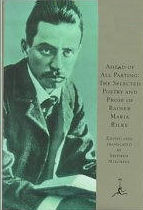 |
Ahead of All Parting:
The Selected Poetry and Prose of Rainer
Maria Rilke
by Rainer Maria Rilke, Stephen Mitchell (Translator)
- Hardcover: 640 pages
- Publisher: Modern Library;
- Language: English
- ISBN-10: 0679601619
- ISBN-13: 978-0679601616
Rating ***** 5 stars out of 5.
 Essential
Essential |
I studied German, just to read Rilke (my favorite poet, even in
translation) in his native language.
This is one of my favorite collections of poetry. Excellent translation (though
I'd recommend you collect several to get different views to clarify the exact
meaning), very , very rewarding reading. This translation manages to capture not
only the meaning but also the "feel" of the original text. Mitchell's rendering
of Rilke enables the non-German-reader to experience Rilke's poetry in spirit as
well as sense. (I'm not a great fan of all of Mitchell's work, but this is
exceptional). I have virtually every translation of Rilke in print, and this is
the book that I return to most often. This volume contains all of Rilke's major
poetry and selections from his prose, so it's a great introduction to his work.
(And the book itself has great quality)
The first poem, "I live my life in widening rings," is alone worthy of years of
contemplation (see my next review for more on this one). And I never cease to
find inspiration and solace in "For the Sake of a Single Poem." . And the great
Duino Elegies, I have nearly memorized from so many re-readings. I consider
"Ahead of All Parting" one of the most cherished books that I own.
Most Highly Recommended.!
 |
The Book of Hours: Prayers to a Lowly God
by Rainer Maria Rilke, Annemarie S. Kidder
- Paperback: 234 pages
- Publisher: Northwestern University Press;
- ISBN: 081011888
Rating *** 3 stars out of 5. .., December 26, 2001 |
Nice to have a new, complete translation however... I prefer a more careful (more direct) translation of this great work.
Why rewrite and interpret what is clear. Some examples from the
first page: the beautiful passage,
'I live my life in expanding (growing)
circles'
has a phrase
'Ich weiss noch nicht'
very easy to translate as
'I know
not yet' or 'I don't yet know'
here it is translated as
'yet unclear of my role' (which is interpretation, which the reader would have seen, and it misses the
direct beauty of Rilke's style).
And
'um den uralten Turm'
is translated
'around
the tower of old',
which is not bad but isn't
'around the ancient tower.' more
direct and poetic?
And the wonderous conclusion of the passage is
'bin ich ein
Falke, ein Sturm oder ein grosser Gesang'
which is translated as
'be it falcon
or storm or another magnificent song? (another?)
instead of the direct
'am I a falcon,
a storm, or a great song'.
Another example in this paragraph is
'Ich kreise um Gott.und
ich kreise jahrtausendelang'
this passage poetically uses the
word 'kreise' twice to create a symmetry
'I circle around God' and I circle (for) thousands of years.'
instead it is translated
as
'I circle around God and I spin amidst thousands of years'.
So
for the paragraph we have Kidder's:
I circle around God, around the tower
of old, and I spin amidst thousands of years;
yet unclear of my role, be it falcon or storm or another magnificent song.
my version
I circle around God, around the ancient tower, and I
circle for thousands of years;
and I know not yet, am I a
falcon, a storm, or a great song.
(or
and yet, I do not know, am I a
falcon, a storm, or a great song.)
(or
and still, I do not know, am I a
falcon, a storm, or a great song.)
I think the Barrows translation is the best available, but
hope another will appear in the near future or this one will be
revised.
>
GO TO PAGE 1 of LITERATURE
REVIEWS (Modern: Marquez, Rand, Helprin)
GO TO PAGE 3 of LITERATURE REVIEWS
(Dostoevsky, Dante)
GO TO PAGE 4 of LITERATURE REVIEWS
(Tolstoy)
GO TO PAGE 5 of LITERATURE REVIEWS
(Classics, Dante)
GO TO MYTH & PHILOSOPHY BOOK REVIEWS
GO TO the
INTRODUCTION to my LITERATURE REVIEWS (intro)







